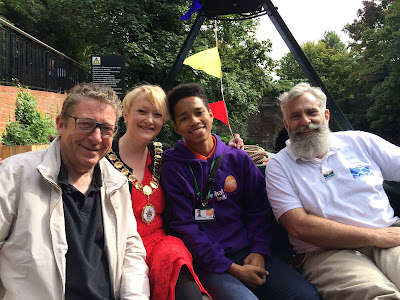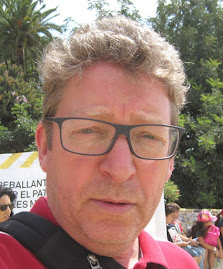As the Chair
of Islington’s Health and Care Scrutiny Committee, and Vice-Chair of the North
Central London Joint Overview Health Scrutiny Committee - JOHSC (which covers
Barnet, Enfield, Haringey, Camden and Islington), I first became aware in early
November of patient concerns about the possibility of closure/decommissioning
of a specialist LUTS clinic, which is run by Professor James Malone-Lee from a
medical centre in Hornsey, and commissioned by Whittington Health. Anxious patients asked to attend the December
meeting of the JOHSC to make a deputation to the committee to express their
concerns. It seems that professor
Malone-Lee has been using a regime of prescribing higher strength, longer-term
antibiotic treatments than is usually considered acceptable under NICE
prescribing guidelines to treat the patients' symptoms. The key point in all this is that the patients have all
tried many times (and failed) to get their symptoms cured under more
conventional treatment regimes, and had been referred to Professor Malone-Lee’s
clinic as a last resort. Many of the patients report that this regime has
worked for them where all others had failed.
We were in
the process of organising to take the deputation when I received a phone call
from Simon Pleydell, Chief Executive of the Whittington, telling me that they
had taken an urgent decision to suspend the clinic following two episodes of
related patient harm. The Whittington
said they would be making alternative arrangements for patients, but this
didn’t seem to transpire.
As soon as
the announcement was made, I started receiving long, anxious emails from
patients, all of whom wanted to talk quite candidly, and in some detail, about
their symptoms, and to relate how the professor’s treatment had been the
difference between a life of almost unbearable discomfort, and a semblance of
normality. I personally received over 50
emails from patients of the clinic, all surprisingly detailed, and with a very
similar story, and ending with the distress and anxiety they were all suffering
at the prospect of not having their prescriptions renewed, and a return to
their suffering.
What followed
was a combination of intense lobbying of the Whittington, and myself, and also
Cllr Alison Kelly (Camden) Chair of the JOHSC.and Cllr Pippa Connor (Haringey)
vice chair, by a very determined group of patients. I had a number of conversations with the
Whittington during which I suggested that, given the patients’ clear
understanding of the risks of the treatment, and that they considered this risk
worth taking, that the clinic should be re-opened on the basis of an agreement
with patients about the risks, perhaps some kind of disclaimer similar to that used with cancer patients.
The
Whittington then held a meeting with patients, whilst at the same time a group
of patients took the issue of the closure to court. The Whittington seemed generally chastened
and surprised by the strength of feeling, and the loyalty of patients to the
clinic. Shortly afterwards, an agreement
was reached with Prof Malone-Lee to a lesser restriction on his prescribing and
for a full independent review of the clinic and it’s practices to be carried
out, following which the clinic was re-opened.
About a week
later the JOHSC took the deputation, and after about an hour’s debate, we
arrived at a series of recommendations to ensure that the independent review of the clinic is properly carried
out, and that patients would be protected meanwhile. The recommendations, as agreed by the
committee are as follows:
Recommendations:
1. That
the Committee be minded to consider any proposal to decommission the LUTS
Clinic by local CCGs as a substantial variation to services and that the issue
be referred to the Secretary of State should such a proposal proceed without
comprehensive consultation on the grounds of failure to consult.
2. That
the committee be given the terms of reference for the external review of the
LUTS clinic, that the terms of reference of the review should include the
Whittington’s actions leading up to the suspension of the service, and
that the results and recommendations of the review be presented to a future
meeting of the committee prior to any further decisions being taken to
decommission.
3. That
the Committee be updated with the Strategic Risk Register from Whittington
Hospital and that the communications and engagements strategies and
responsive action plans are shared with the Committee, to satisfy the
committee that appropriate arrangements are in place should similar
circumstances occur in respect of any future urgent actions by the Whittington.
4. “That
letters be sent to both Haringey and Islington CCGs requesting confirmation
that they will not be proceeding with their proposed decommissioning of the
LUTS Clinic pending the outcome of the Independent Review.”
Actions:
In
relation to the level of treatment and the prescriptions that were carried out
at LUTs Clinic, Councillor Pippa Connor, requested that the Committee receive
an update on whether any medical studies or reviews were undertaken by UCL
about the treatment provided to patients.
I appreciate
this is a very abbreviated version of events, which excludes a number of
details. However, I think the most
important issue is to get the committee’s recommendations published as soon as
possible, since with regard to protecting patients’ health, the recommendations
are aimed at protecting them in the short-term as well as the long-term, and I
want patients to have the recommendations to hand, should discussions arise
with either the Whittington, Prof Malone-Lee or UCLH, with whom the Prof
carries out his research.




